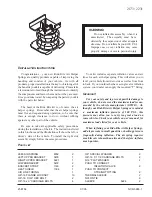
volts for a battery with a 25% charge.
Even a fully charged battery cannot
deliver power unless it is properly
connected to the electrical system.
Check the battery terminals for
corrosion or loose cable connections. If
the battery does not maintain the
proper voltage, the charging system
may be at fault. See
121 Battery,
Alternator, Starter
.
If a battery cable connection has no
visible faults, but is still suspect,
measure the voltage drop across the
connection. A large drop indicates
excessive resistance, indicating that the
connection is corroded, dirty, or
damaged. Clean or repair the
connection and retest.
Note:
For instructions on conducting a voltage
drop test and other general electrical
troubleshooting information, see
600
Electrical System–General
.
The DME system operates at low
voltage and current levels, making it
sensitive to small increases in
resistance. The electrical system is
routinely subjected to corrosion,
vibration and wear, so faults or
corrosion in the wiring harness and
connectors are not uncommon.
Visually inspect all wiring, connectors,
switches and fuses in the system.
Loose or damaged connectors can
cause intermittent problems, especially
the small terminals in the ECM
connectors. Disconnect the wiring
harness connectors to check for
corrosion, and use electrical cleaning
spray to remove contaminants.
Main grounds
Engine-General
http://ebahn.bentleypublishers.com/BMW/3/E46/Repair%20Manuals/1...
2 of 4
2/25/2009 9:59 PM
















































